Feeling stuck and unfulfilled? Learn how the ancient idea of “Memento Mori” can be a powerful motivator to ditch distractions, live with purpose, and make the most of every day.
When I was working on my article about the 12 Stoic principles, I accidentally came across the term “Memento Mori” – which, after a little research, I found one of the cornerstones of Stoicism and other related philosophies/ spiritual traditions. Since then, it has constantly popped up in my mind, reminding me of the importance of living my life to its fullest (and of why I should stop indulging myself in distracting activities that do not bring me closer to “the light”). While the phrase might appear morbid to many people, I believe it doesn’t have to be that way – quite the opposite actually. Thanks to it, I have been given the reason and motivation to wake up every day – and to keep doing things that I have been doing (even though I cannot see their results immediately).
Highlights
- Memento Mori, a Latin phrase meaning “remember you must die,” is a reminder of life’s impermanence – as well as of the importance of living a virtuous and fulfilling life. Originating from philosophical and practical reminders of mortality in the ancient ages, the term has evolved into a cultural theme prominent in art, religion, personal development, and even fashion.
- Though seemingly unique, the concept shares the idea of contemplating death to live meaningfully with traditions like Buddhism, Samurai ethics, and Islamic practices.
- Considering death’s unpredictability, Memento Mori urges us to make the most of our limited time – by appreciating the present, prioritizing what matters, and striving to leave a positive legacy. Rather than fearing death, which is inevitable and potentially positive, we should focus on how we are living our lives right now.
- The philosophy can be practiced daily through small acts like carrying a reminder object, daily reflection, self-questioning, mindful living, investing in relationships, and being fully in the present.
What is Memento Mori?
Memento Mori (pronounced “mə-MEN-toh MOR-ee”, lit. “remember death”) is a Latin phrase that is often translated into English as “Remember you must die“. A powerful concept that has resonated throughout history – appearing in various philosophical and artistic traditions, it reminds us of the fragility of life and the importance of living each day to the fullest.
The phrase is typically associated with the Stoic philosophy, which emphasizes the importance of reflecting upon our inherent mortality as a means to cultivate inner peace and wisdom – and of living a virtuous life in accordance with reason and nature. Stoics believed that death was not something to be feared, but rather an inevitable part of life. As such, we need to live each day to the fullest and not waste time on things that are not important.
Sometimes, it is used as part of other phrases such as “Memento mori, Memento vivere” (meaning “Remember to die, Remember to live”), “Memento mori, Carpe diem” (“Remember you will die; Seize the day”), and “Memento mori, Amor Fati” (“Remember you will die; Love your fate”).
Origin & Development of Memento Mori
The one aim of those who practice philosophy in the proper manner is to practice for dying and death.
Socrates
The origin of the term Memento Mori is often attributed to the statement above of Socrates – who believed that the role of philosophy is to encourage people to contemplate life and death. Additionally, its roots can also be traced to the ancient Roman practice of reminding victorious generals of their fleeting mortality during triumphant parades. Specifically, during their triumphant parade, one would be accompanied by a slave who would whisper to him:
Respice post te! Hominem te esse memento! Memento mori!
(Look behind! Remember thou art mortal human! Remember you must die!)

Later, the concept was promoted by Stoic philosophers like Seneca and Epictetus, who embraced it as a tool for living a virtuous life in the face of inevitable death.
Keep death and exile before your eyes each day, along with everything that seems terrible. By doing so, you’ll never have a base thought nor will you have excessive desire.
Epictecus
Over time, Memento Mori transcended its philosophical origins and became a prominent theme in various settings. Many religious architecture and scriptures (particularly those of Christianity) depicted the concept to encourage contemplation on mortality and the afterlife. Likewise, medieval literature often reflected on the fleeting nature of existence, while artists incorporated evocative symbols into their creations (paintings, sculptures, and even jewelry) to remind viewers of life’s impermanence:
- Skulls represented the physical remains, while bones symbolized the body’s return to earth.
- The ever-diminishing hourglass served as a stark reminder of time’s relentless march.
- Flowers, often depicted withering, highlighted the ephemeral nature of beauty.
- Coffins or the Grim Reaper itself – both personified death.
- Extinguished candles became a poignant symbol of life’s finite flame.
- etc.
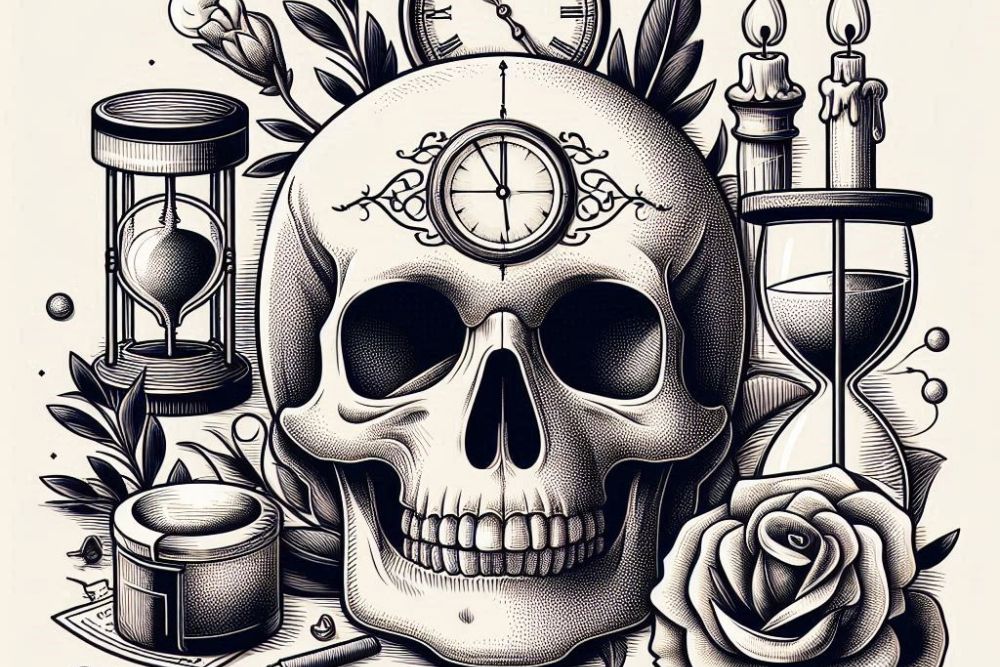
Memento Mori symbol examples
Certain historical events further solidified the phrase’s cultural significance. For instance, the devastating Bubonic Plague brought death to the forefront of people’s minds, leading to a surge in Memento Mori art and literature. An example is the emergence of the “Dance of Death” (Danse Macabre) artistic genre, which vividly illustrated death’s universality – regardless of one’s social status. The message embedded in these creations was simple: no matter who you are – farmer, priest, king, beggar, etc., nobody can escape death.
It doesn’t matter how much wealth/ fame/ success/ achievements you have accumulated in life. In the end, everyone’s fate is the same: in the grave.
During the Medieval period, funeral practices often incorporated “Memento Mori” symbols and messages (e.g. inscriptions on gravestones) to promote reflection on life’s impermanence and the inevitability of the end.
Moving to the 16th century, the emergence of the Vanitas art genre marked another milestone. Paintings typically showcased objects representing the impermanence of earthly pleasures – so that viewers might have a chance to confront their own fragility and the futility of material possessions.
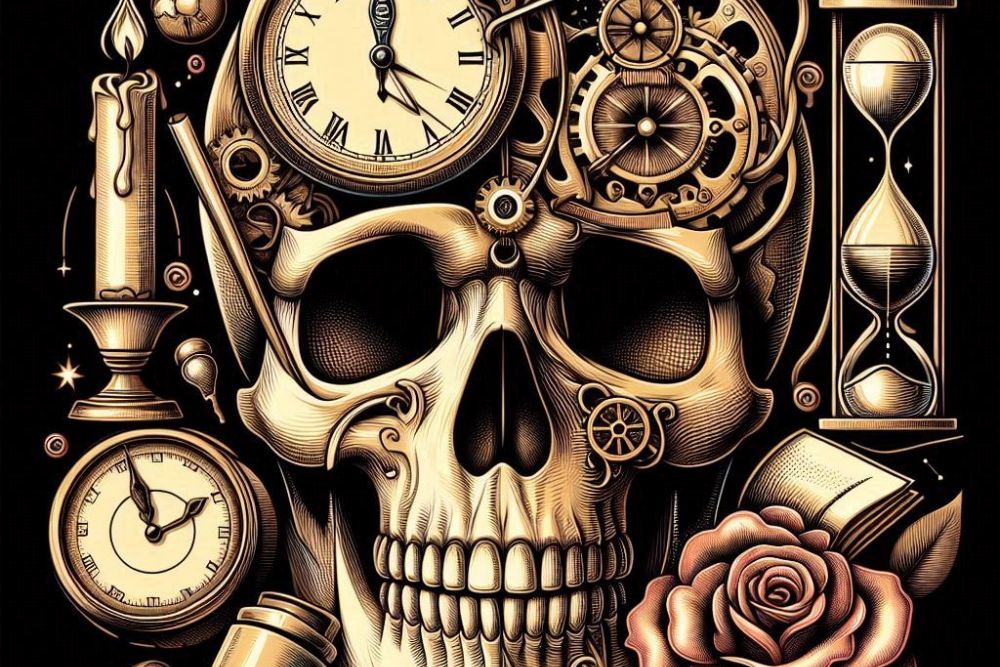
In today’s fast-paced world, the term “Memento Mori” has not lost its appeal (if not more relevant than ever). It finds its way into modern culture, personal philosophies, and art forms. From the symbolic embrace of skulls in fashion to its use as a motivational tool for mindful living, the concept serves as a powerful reminder of life’s fleeting nature – and why we need to make the most out of our time. In fact, successful figures like Steve Jobs have attributed their achievements to keeping their mortality in mind – that achievement and fulfillment matter more than just accumulating possessions or chasing fleeting pleasures.
Remembering that I’ll be dead soon is the most important tool I’ve ever encountered to help me make the big choices in life.
Steve Jobs

Inscription above the entrance of Capela dos Ossos (Portugal): “Our bones that are here await yours”
Memento Mori vs Similar Concepts/ Traditions
Of all mindfulness meditation, that on death is supreme.
Buddha
The phrase “Memento Mori”, while seemingly unique, shares striking similarities with various concepts and traditions across different cultures:
- Anicca (Impermanence): A core idea of Buddhism, it highlights the ever-changing nature of reality, including our own lives (which aligns with Memento Mori’s focus on the fleeting nature of existence).
- Maraṇasati (Death Awareness): This practice involves contemplating death and impermanence as a way to cultivate detachment from worldly desires and focus on spiritual liberation.
- Zen: While not explicitly focused on death, Zen Buddhism encourages people to practice mindfulness and live in the present moment. This aligns with the idea of using the awareness of mortality to appreciate the present in Memento Mori.
- Samurai Ethics: The Bushido code (武士道) of the samurai class emphasized living with honor and courage, knowing that death could come at any time.
- Hanami (花見 – Cherry Blossom Viewing) & Momijigari (紅葉狩り – Autumn Leaves Viewing): These Japanese traditions celebrate the beauty of nature’s ephemeral moments. They serve as reminders of the fleeting nature of life and the importance of appreciating its beauty while it lasts.
- Lojong (Tibetan Buddhism): Through contemplating the suffering of others and human life’s impermanence, one is called to make the most out of their limited time – by cultivating compassion, practicing altruism, and striving to make a positive impact on the world.
- Tadhkirat al-Mawt (Remembrance of Death): This Islamic concept emphasizes reflecting on death as a way to cultivate piety and detachment from worldly possessions.
The core similarity across these concepts and traditions is the contemplation of mortality and its use as a tool for self-reflection, ethical living, and appreciating the present moment.
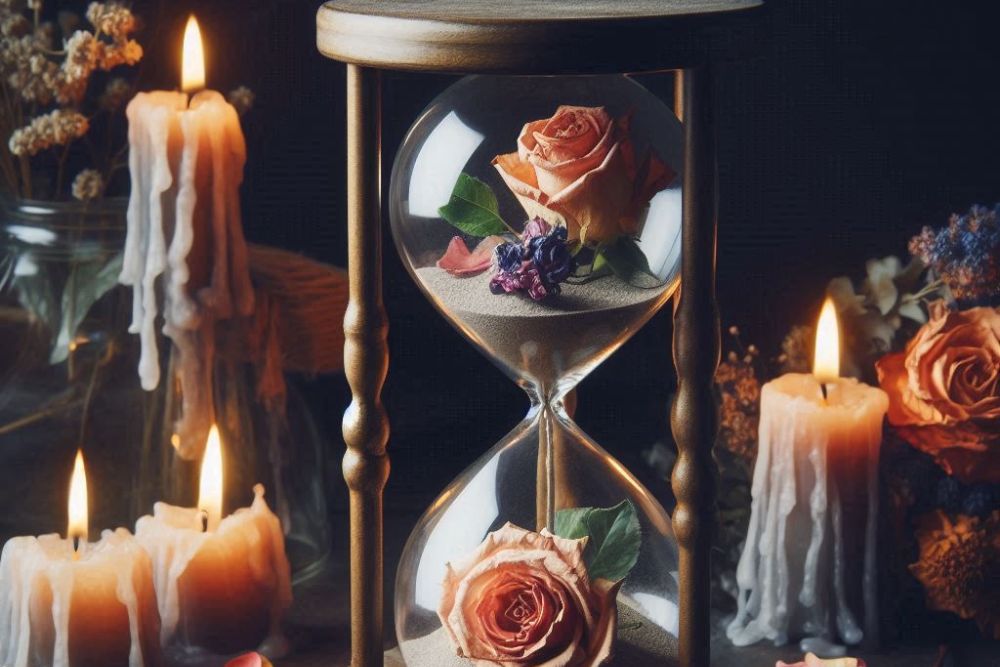
Why is Memento Mori Important?
We are so consumed with wanting this or that or are wanting to solve the problems that we fail to see Life’s impermanence.
AVIS Viswanathan
In a world that’s become demonstrably safer and more comfortable, it’s easy for many of us to fall into the illusion of permanence and take life for granted. Despite its universality, death is something we often avoid discussing – either out of discomfort or the belief that we still have plenty of time on earth.
And yet, is that true?
Despite our assumptions, death may come much earlier than we expect. Sometimes, we may think that we are sure to die – and yet still manage to come out on top later.
That said, the experience alone should be enough to remind us of life’s unpredictability. Of our inevitable end.
Here, I would like to share with you my personal anecdote – about the last time when I was so close to death. For some reason, I am still able to recount it so vividly as of now.
It was around 9:15-9:30 PM on Sunday, 31 October 2022. I was returning home via Grab. We were already at the entrance of the alley that leads to my house.
My bike driver, I assumed, was a little careless and ignorant. He accidentally passed by the alley’s entrance – and I reminded him of that.
He immediately turned around, fast, without looking back to see if there was anyone behind.
And he had not finished turning yet – when another driver from behind pumped right into us and sent us (almost) flying.
Everything happened so quickly. It was merely a few seconds, and yet it was one of the most terrifying moments in my life (up to now).
Never had I been that close to death. Never had I felt that I no longer had control over anything.
Fortunately, I managed to get away from the accident with only one broken little toe.
As time went by, I started forgetting about the incident. That is – until I came across the term “Memento Mori” two months ago.
At that moment, I realized how ignorant I had been. I should have been much more humble and purposeful following the accident. I should have internalized how lucky I had been. That my life was spared for a reason I don’t know.
I assume maybe part of my ignorance stems from the fact that I, luckily, have not directly witnessed the deaths of many loved ones. Up to now, most of my relatives have not passed away yet – except for my uncle and grandfather.
The death of my uncle (who, regretfully, committed suicide by self-immolation due to distress) has caused me a little bit of trauma upon hearing about it. Still, I was not there to witness the incident (nor to directly participate in his funeral) – so I guess the impression was not quite moving enough. When I saw his suicide note later, I did feel a sense of unease creeping into my mind – but only for a moment though.
For my grandfather, he had been disabled years before his death. So when the time came, everyone was already expecting it. Even though I did see his corpse with my own eyes, bowed before his coffin, and joined his funeral later, I did not quite feel it (though still somehow humbled).
Recalling these moments – when I was exposed to the inevitability of death – makes me realize how relevant the phrase “Memento Mori” is. It reminds me of the impermanence and unpredictability of life – as well as why I should strive to make the most of the precious time I have.
Think about recent crises like the Covid-19 pandemic. In many ways, our modern world tends to push death aside. Medical advancements and a focus on longevity have seemingly created an illusion that we’ll all live forever. Ironically, the pandemic completely shattered that illusion.
The virus had no discrimination. Everyone was subject to being infected. Millions of lives were lost – and all governments/ scientists in the world couldn’t do anything about it.
Thousands of businesses were closed, and many went bankrupt with no hope of revival. Societal structures were seriously threatened.
What a contrast to our often sanitized view of mortality!
Vanity of vanities; all is vanity.
Ecclesiastes 1:2
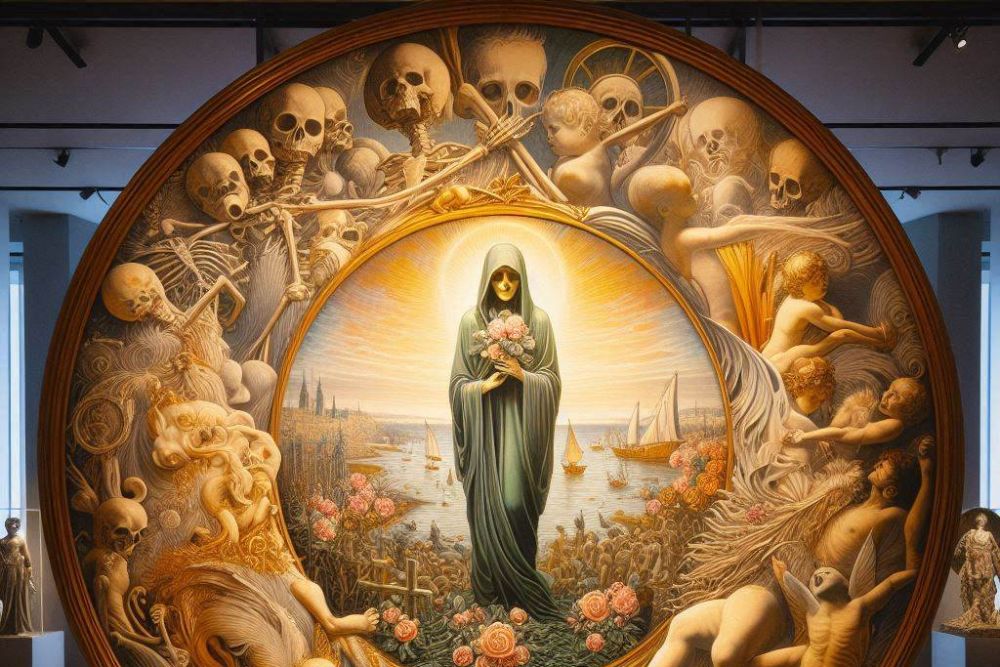
Even though the pandemic has receded – and life has come back to normal, we are not to forget the message it has left behind.
That we are fragile mortals and not masters of this world.
That one day, all of us will die.
And that we need to make the most of the precious time we have in this world.
You may not wake up tomorrow… You may not sleep again.
Seneca
Benefits of Memento Mori
Analysis of death is not for the sake of becoming fearful – but to appreciate this precious lifetime.
Dalai Lama
- Living purposefully: By acknowledging our limited time, we are encouraged to identify what truly matters and prioritize actions that align with our values – instead of procrastinating or getting caught up in trivialities.
- Embracing the present: The impermanence of life reminds us to savor each moment, appreciate the beauty of daily experiences, and avoid putting off happiness for some future date.
- Cultivating gratitude: Reflecting on mortality fosters gratitude for the simple things in life – our relationships, health, experiences, and time with loved ones – that we might otherwise take for granted. They are all precious and not guaranteed; don’t let them slip away in vain!
- Leaving a positive legacy: Knowing our time is finite is a strong motivator for acts of kindness, creativity, and contributions to a cause we believe in.
You could leave life right now. Let that determine what you do and say and think.
Marcus Aurelius
Why We Should Not Be Afraid of Death (and Instead Embrace Our Mortality)
After all, to the well-organised mind, death is but the next great adventure.
J. K. Rowling
Memento Mori isn’t necessarily about embracing death itself – but rather using the awareness of our mortality as a tool for a richer life. After all, we will all die – and what happens after death is not something we can control. Hence, there’s no point worrying about it.
From a religious/ spiritual perspective, death is not the end, but the beginning. Our consciousness will linger in a variety of possible ways – paradise, limbo, reincarnation, etc., you name it.
From a completely secular perspective, since we cease to exist after death, there’s no consciousness to experience the fear itself.
So whether you profess any faith or not, we all boil down to the same conclusion:
There’s no need to be afraid of death.

The only thing we need to fear is non-existence while still alive. In this context, Memento Mori reminds us to focus on the present, where we can live life to its fullest and avoid fixating on something beyond our control.
Instead of wasting energy on self-indulging or worrying about the unknown (what happens after death), it’s much better to redirect our energy toward other more meaningful things: how we live, the relationships we build, and the impact we make.
Are we living authentically – in accordance with what we truly hold dear, without being restrained by societal pressures?
Are we cherishing the time with our loved ones, and willing to resolve conflicts/ mend broken relationships?
Are we actively chasing our passions and doing our best to make a difference while we can?
The true master does not seek to run away from Death. He accepts that he must die, and understands that there are far, far worse things in the living world than dying.
J. K. Rowling
How to Live by Memento Mori in Daily Life: Practical Tips & Exercises
Never forget that you must die; that death will come sooner than you expect.
John Furniss
Start small and consistent
- Memento Mori object: Carry a small object, like a smooth stone or a Memento Mori coin, as a physical reminder of your mortality. Briefly hold it throughout the day to refocus on what matters. Or, you can set a daily phone notification with a Memento Mori quote/ prompt to keep it on top of your mind.
- Daily reflection: Dedicate a few quiet moments each day, perhaps during your morning routine, to contemplate your mortality. You can simply acknowledge it with a phrase like “Today is a gift”, or ask yourself with a prompt like: “If today were my last, what would I regret not doing?” As simple as it is, consistent self-reflection should nudge you toward prioritizing actions that align with your values.
If this was the last week of your life, what would you cherish most? How would you live? How would you love? What truth would you tell today?
Tony Robbins
Live with intention
One day you will wake up & there won’t be any more time to do the things you’ve always wanted. Do it now.
Paulo Coelho
- Gratitude journaling: Before going to bed, take the time to express gratitude for the blessings in life, big or small. Write down three things you’re grateful for the day – be it the taste of your favorite food, a meaningful conversation, or simply being alive. The more you do it, the easier you will find it is to realize how precious life is (and how fortunate you have been)!
- Eulogy exercise: Imagine you’re writing your own eulogy. What qualities and accomplishments would you want to be highlighted? This practice should help identify what truly matters to you and guide your present actions.
- “Live list” vs. “To-do list”: Create a “Live List” (or “Bucket list”) alongside your regular to-do list. On your Live List, write down experiences you want to have, relationships you would like to nurture, or skills you desire to learn. This is a great way to keep long-term goals and passions in mind.
- Schedule “What Matters Most” time: Block out dedicated time in your calendar for activities that bring you joy and fulfillment, whether it’s spending time with loved ones, pursuing a hobby, or working on a creative project. Ask yourself: “Would I be happy if this were the last time I did this?”
- The “One Year Left” prompt: Contemplate what you would do differently if you knew you only had one year to live. In doing so, you may realize areas where you might be holding back or neglecting what’s important.
Read more: 250 Bucket List Ideas for Living Your Best Life
Deepen connections
- “Love bomb”: As awkward as it may seem initially, you should consider scheduling regular “love bombing” sessions where you shower your loved ones with affection and appreciation – whether by writing a heartfelt note, expressing gratitude for their presence, or simply spending quality time together. You never know how much time you have left!
- Practice forgiveness: Holding onto anger and resentment will just result in an unnecessary burden. Life is too short – after all, the connections we have will not last forever. Hence, we need to learn to let go of negativity and mend broken relationships now – before it’s too late! Is there someone you need to forgive or apologize to? Reach out to them before you no longer have a chance for reconciliation!
- Reach out proactively: Don’t wait for special occasions to connect with loved ones. Make a call, send a message, or plan a visit (whatever works for you) to strengthen the bonds.
When you arise in the morning think of what a privilege it is to be alive, to think, to enjoy, to love…
Marcus Aurelius
Embrace the present moment
- Mindfulness practices: Integrate mindfulness exercises like meditation or mindful breathing into your day. These practices help you focus on the present moment and appreciate the beauty of everyday experiences.
- Digital detox: Schedule regular breaks from technology to be fully present in the real world. Engage with your surroundings, savor your meals, and give your full attention to the people you’re with.
- Savor simple pleasures: Take time to appreciate the small joys in life – a delicious cup of coffee, the warmth of the sun, a meaningful conversation. Memento Mori reminds us that these simple moments are precious and will not last forever; hence, do not let them slip away!
Hodie Mihi, Cras Tibi.
(My turn today, yours tomorrow)
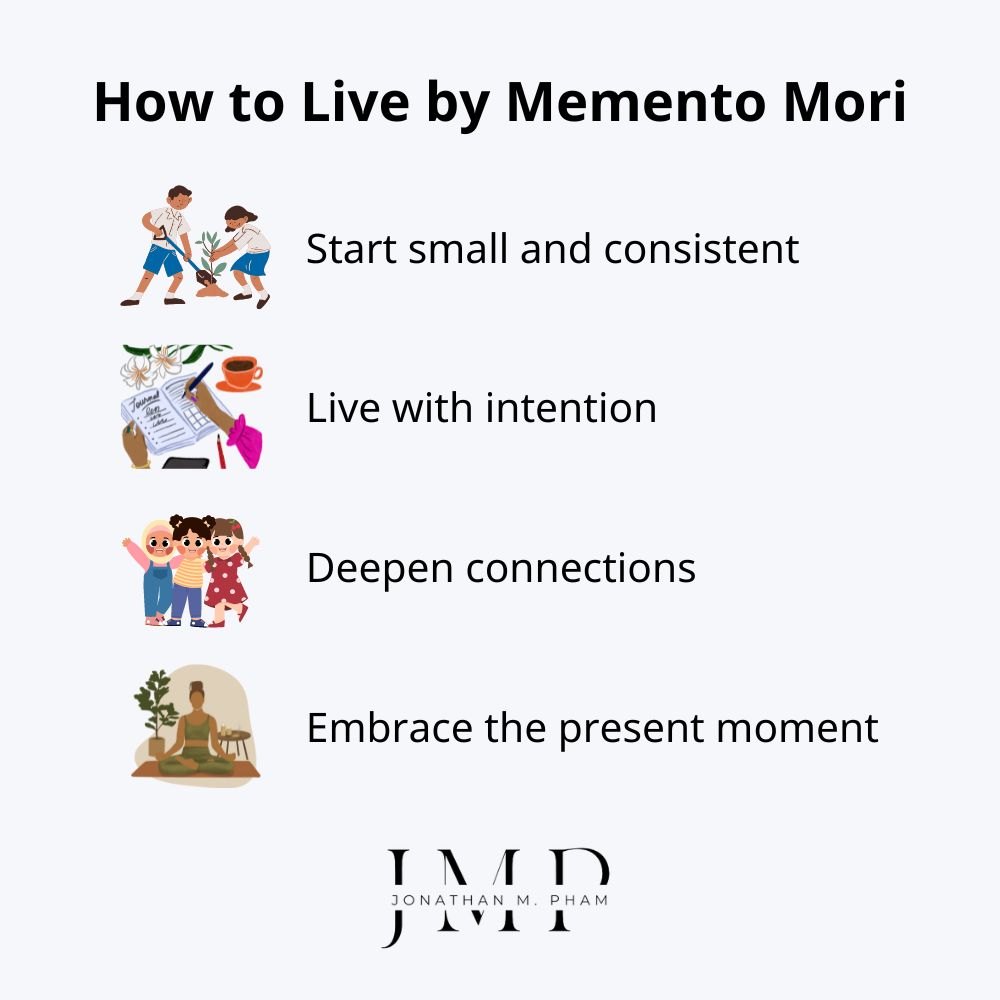
Viva la Vida (“Live the Life”)
FAQs
Why is Memento Mori so popular?
The phrase’s enduring popularity may be attributed to several factors that touch on fundamental human experiences:
- The universality of death: The concept’s core strength lies in its undeniable truth. Death is a common denominator, a leveler that cuts across cultures, ages, and social standing. At some point in our lives, we all will have to think about it (even if we don’t want to).
- Mindfulness in a frantic world: In an era of constant busyness, Memento Mori acts as a pause button. It reminds us to slow down, appreciate the present moment, and prioritize what truly matters – so as to better navigate the complexities of modern life.
- A call to action: A powerful motivator in self-help and personal development circles, the concept of Memento Mori encourages us to acknowledge our mortality – so that we may have the motivation to live a life of purpose, pursue our passions with a sense of urgency, and not take our time on earth for granted.
- Aligning with Stoic philosophy: The recent renewed interest in Stoicism, which emphasizes virtue and living a meaningful life in the face of inevitable death, makes the phrase relevant in philosophical discussions about finding purpose and flourishing in the face of impermanence.
- A shift in cultural norms: Our societies are slowly becoming more comfortable with openly discussing death. Memento Mori fits into this narrative by encouraging a healthy acceptance of life’s finite nature. It allows us to confront our mortality head-on and leverage that awareness to live more fully.
In essence, Memento Mori’s enduring appeal lies in its ability to confront us with a fundamental truth – that our time is finite. This stark reality, however, doesn’t breed despair. Instead, it gives us a reason to live more meaningfully, appreciate the present moment, and strive to leave a positive mark on the world before our inevitable departure.
Is Memento Mori a good saying?
Is Memento Mori positive or negative? While it is certainly a powerful saying with a lot of potential for positive impact, like anything, we need to evaluate its opposite side too:
Upsides:
- Focus and purpose: Contemplating it may encourage mindfulness and a sense of urgency, leading people to prioritize what truly matters and live a more fulfilling life.
- Acceptance: By accepting the inevitability of our own demise, we become better equipped to let go of unhealthy anxieties and appreciate life’s preciousness.
- Motivation: Knowing that our time is finite acts as a potent motivator to pursue goals and aspirations before it’s too late.
Potential downsides & misinterpretations:
- Anxiety and fear: For some, dwelling on death may lead to anxiety and existential dread. It’s important to frame Memento Mori as a motivator, not a source of fear. Instead of being too obsessed with what happens after death (which is a universal mystery), it’s better to focus on living a meaningful life now.
- Obsessive dwelling: Constantly focusing on death can be paralyzing. The goal is to be mindful, not consumed by mortality.
- Nihilist viewpoint: Misinterpreting Memento Mori could lead to a nihilistic view, where nothing matters because everyone dies anyway (hence one should stop actively contributing to the community/ living a meaningful life).
Navigating the downsides:
- Balance: Focus on the positive aspects of Memento Mori. It’s about appreciating life, not fearing death.
- Gratitude: Use the awareness of mortality to cultivate gratitude for what you have in the present.
- Action: Don’t just dwell on mortality, take action! Pursue your goals and live a life you’ll be proud of.
“I wish it need not have happened in my time”.
“So do I, and so do all who live to see such times. But that is not for them to decide. All we have to decide is what to do with the time that is given us.”
J. R. R. Tolkien, Fellowship of the Ring
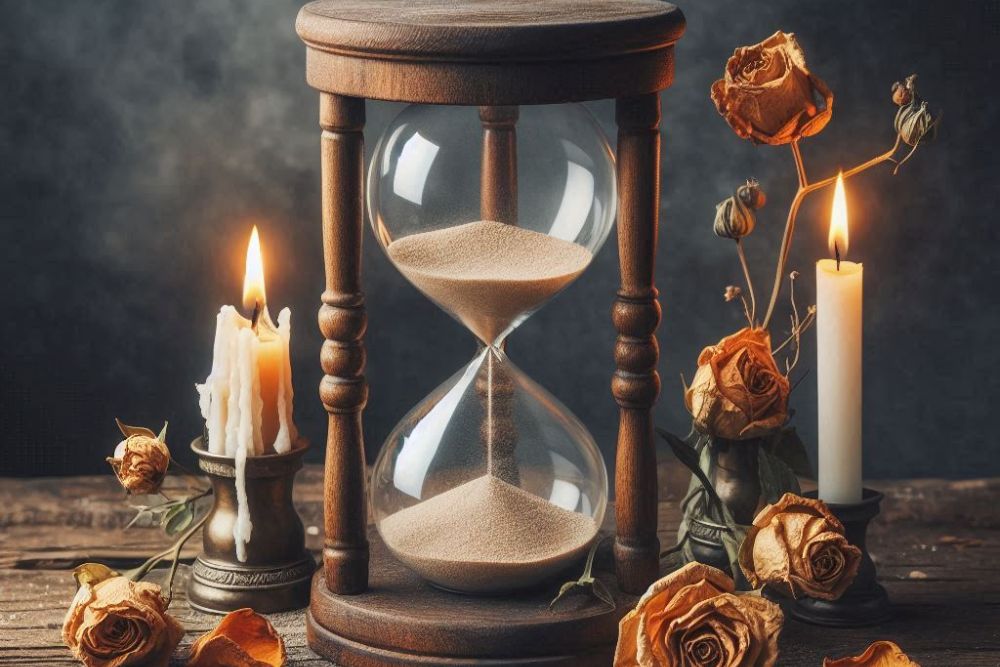
Memento Mori Quotes
My life is like a Memento Mori painting from European art: there is always a grinning skull at my side to remind me of the folly of human ambition.
Yann Martel
Live like there’s no tomorrow. Love like you’re on borrowed time. Always remember, it’s good to be alive.
Jason Gray
Begin doing what you want to do now. We are not living in eternity. We have only this moment, sparkling like a star in our hand – and melting like a snowflake.
Francis Bacon
Memento Mori – remember death! These are important words. If we kept in mind that we will soon inevitably die, our lives would be completely different.
Leo Tolstoy
The one who puts the finishing touches on their life each day is never short of time.
Seneca
Let each thing you would do, say, or intend be like that of a dying person.
Marcus Aurelius
Remember how fleeting is my life.
Psalms 89:47
These three little words… you’re gonna die. It’s the guiding light and the fire and ambition that drives me toward legacy and living my best life.
Gary Vaynerchuk
There is wonder all around us, but we are ephemeral.
Tim Ferriss
To practice death is to practice freedom. A man who has learned how to die has unlearned how to be a slave.
Michel de Montaigne

Final Thoughts
Since I first came across it, “Memento Mori” has become a constant mantra in my life. It whispers in my ear during free moments, a grounding force when doubt creeps into my mind, and a beacon of hope when I seem unable to find meaning in what I do. To me, knowing that my time is finite is not a burden – but a powerful motivator. It compels me to shed the inessential and focus on what truly matters.
While the concept might seem counterintuitive, I believe that only by accepting our mortality can we truly embrace life. So, what are you waiting for? Let this be your nudge to shed the distractions and truly start living. Because as Memento Mori reminds us, tomorrow is never guaranteed!
Remember you must die!
Other resources you might be interested in:
- The Power of Goal Setting: A Blueprint for Success
- Gaman (我慢): The Unspoken Power of Japanese Endurance (Plus Its Relevance in Today’s World)
- Shikata ga nai (仕方がない): The Art of Finding Serenity in Acceptance
- 50 Spiritual Questions: Awakening the Soul
- 37 Spiritual Activities: Cultivate The Inner Light
Let’s Tread the Path Together, Shall We?


